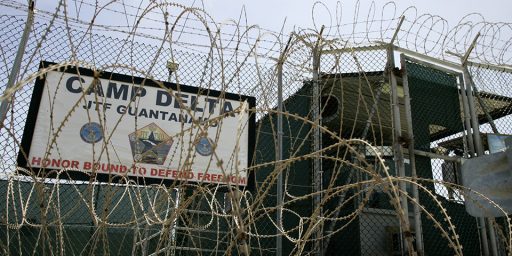Guantanimo Reorganization
Washington Times — Military Panel To Try Terror Suspects
The Pentagon announced yesterday the creation of the first commission to try three suspected al Qaeda members held at Guantanamo Bay, Cuba, as the government also made plans to provide new legal rights to all detainees as a result of a Supreme Court decision.
The commission will consist of five military officers, one of whom, Army Col. Peter E. Brownback III, will be called back to active duty as the presiding officer. Col. Brownback is a retired military judge advocate and judge.
The Pentagon’s Office of Military Commissions has selected three of the 595 detainees from the Afghanistan war as the first to face criminal charges and trials. They are David Hicks of Australia; Ali Hamza Ahmed Sulayman al Bahlul of Yemen, a bodyguard for Osama bin Laden; and Ibrahim Ahmed Mahmoud al Qosi of Sudan, also a bin Laden guard and driver.
President Bush designated those captured in Afghanistan as “enemy combatants” not entitled to all the rights of the American court system.
The Supreme Court on Monday ruled the administration had the right to hold them as part of the war on terrorism. But it overruled the administration’s position that it could deny prisoners access to U.S. courts. The court said each detainee has the right to petition a federal court to free them in what is called habeas corpus. The government would then have to show evidence in court why the suspected terrorists should continue to be held.
The administration is bracing for a flurry of petitions on the detainees’ behalf. One key question is whether each is entitled to a government lawyer. Officials said Justice Department lawyers have been meeting since the decision to determine this and other issues. The Supreme Court did not say the government was obligated to provide lawyers. But lawyers wishing to defend prisoners should be able to seek a U.S. District Court hearing, said Eugene R. Fidell, a Washington, D.C., defense lawyer who specializes in military law. “It would seem to me to be an abuse if the government thwarted inner action between willing detainees and willing attorneys,” Mr. Fidell said.
A U.S. District Court judge could rule the government is justified in holding the detainee, or order more hearings, perhaps before a military commission like the one named by the Pentagon yesterday, said U.S. officials, who asked not to be named. Or, a judge might order a detainee released, meaning the government would then appeal.
The ruling could also mean the Pentagon will no longer send new prisoners to Cuba from Afghanistan. No detainee from Iraq has been sent to Guantanamo.
Legally, the administration believes detainees can be adjudicated in Afghanistan and Iraq since they both now have sovereign governments.The prime reasons for holding detainees are to keep them off the battlefield and to gain intelligence information on al Qaeda, the Taliban and terrorists groups. A prisoner selected for trial must be suspected of war crimes and is no longer considered an intelligence asset. “We’re not planning on trying everyone down there,” said Air Force Maj. John Smith, spokesman for the Pentagon’s Office of Military Commissions. “Only the ones where there is evidence they may have committed war crimes.”
Establishing military tribunals, or some sort of Article II special court with judges who understand the nature of classified information and national security affairs, seems like the obvious reaction to the Court’s ruling. Indeed, it should have been the norm all along. Due process is not only legally necessary but good policy. It makes no sense to house large numbers of people you don’t actually have any reason to hold.
In related news,
LA Times — Detainees May Be Moved Off Cuba Base
Senior Bush administration officials are considering moving hundreds of detainees from a facility in Cuba to prisons within the United States in response to Supreme Court rulings this week that granted military prisoners access to U.S. courts, officials said Tuesday.
As attorneys for detainees at the U.S. naval base at Guantanamo Bay, Cuba, began preparing the first of hundreds of expected lawsuits demanding that the government justify the detentions, administration officials acknowledged that they were unprepared for a rebuke in two landmark Supreme Court decisions that rejected the military’s treatment of prisoners in the war on terrorism.
Now, after being handed the losses, the administration has been left to scramble to develop a strategy for granting hearings to detainees without having to cope with an unwieldy series of lawsuits throughout the nation. “They didn’t really have a specific plan for what to do, case by case, if we lost,” a senior Department of Defense official said on condition of anonymity. “The Justice Department didn’t have a plan. State didn’t have a plan. This wasn’t a unilateral mistake on Department of Defense’s part. It’s astounding to me that these cases have been pending for so long and nobody came up with a contingency plan.”
To avoid ferrying prisoners and government lawyers to federal courts across the country, as might be required, Pentagon and Justice Department officials said they had discussed moving all detainees to a military prison in a conservative judicial district within the United States to enable the consolidation of all the proceedings in one court. They said possible locations could be Ft. Leavenworth, Kan., where there is an Army base with a military prison, or Charleston, S.C., home of the Charleston Naval Weapons Station, which houses the Navy brig.
Another option would be to allow prisoners to file for writs of habeas corpus — a demand for legal justification for their imprisonment — at a makeshift court at the base in Cuba. The Supreme Court left open the possibility of such an option.
Under a third proposal offered Justice Department officials and discussed at a high-level interagency meeting Tuesday, a senior administration official said, the administration would ask Congress to designate one federal court district to try the cases — most likely Washington, D.C., or the Eastern District of Virginia, whose jurisdiction includes the Pentagon.
The changes could occur as part of a general reorganization of Guantanamo currently under consideration in which the prison facility would be revamped, with detainees segregated by the level of threat they are thought to pose, the senior administration official said.
Interesting.




